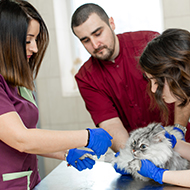First ever census for homeless cats and dogs The first ever UK homeless pet census has been carried out to establish the scale of the problem and to find out what can be done to ease the suffering of abandoned pets.
Of 1,380 organisations contacted by vets working on shelter medicine at the University of Nottingham's School of Veterinary Medicine and Science, who carried out the survey, fewer than 40 percent responded.
The response has caused concern that the actual number of homeless cats and dogs at any one time in the UK is a lot higher than the 28,000 recorded.
The census documents the origins, destinations, husbandry and costs associated with the care of un-owned animals, which was recorded to have cost £340m in 2010. It showed that collectively around 90,000 dogs and 160,000 cats were taken in by the participating organisations in that year.
Of the 250,000 animals, around 75 percent were rehomed, though over a tenth had to be put down.
One of the researchers, Dr Jenny Stavisky, said: "The animal welfare community is really struggling. Rescues are on the increase because of tightened household budgets.
"Some people are forced through circumstance to give up their pets," she added. "There are also concerns that some people are treating dogs and cats as disposable commodities — buying them as accessories to look ‘cute’ or ‘tough’ only to abandon them when the animal becomes difficult because they don’t understand the animal’s complex needs."
Research shows that sheltered animals are at risk of poorer physical and physiological health. The shelter medicine team hope to improve the welfare of these animals by researching the prevention and treatment of diseases, as well as ways of reducing their numbers.
Click
here to read the research paper.






 Birmingham Dogs Home has issued an urgent winter appeal as it faces more challenges over the Christmas period.
Birmingham Dogs Home has issued an urgent winter appeal as it faces more challenges over the Christmas period.
